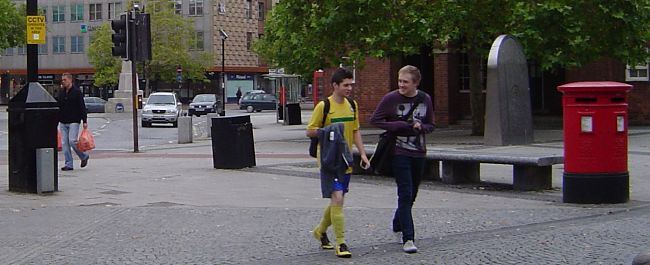Policies that reduce greenhouse gases can improve human wellbeing

This research assesses the impact of urban policies on human wellbeing.
About the research
Climate change is exerting a negative effect on human wellbeing. Sudden adverse changes in the environment are associated with negative feelings and emotions: floods, for example, have been associated with post-traumatic stress disorder. Wellbeing is likely to deteriorate further if climate change continues.
Greenhouse gas (GHG) reduction policies are designed to limit adverse climate changes. Such policies therefore have the potential to enhance the wellbeing of future generations.
The European-funded project Urban Reduction of Greenhouse Gas Emissions in China and Europe (URGENCHE) was one of the first to explore wellbeing impacts of multiple urban policies intended to mitigate climate change. City councils and academic teams from five European cities (Kuopio, Rotterdam, Stuttgart, Basel and Thessaloniki) and two Chinese cities (Xian and Suzhou) participated in the project. The team used both established and innovative models to assess the effects of introducing greenhouse gas (GHG) reduction policies on future levels of wellbeing.
The team also calculated the cost implications of changes in illness rates resulting from the effects of such policies, in order to measure the implications for the financial wellbeing of a city.
Policy implications
- Governments should offer additional support for greenhouse gas (GHG) reduction policies that also improve health, such as active transport policies that encourage physical activity.
- GHG reduction policies that result in lower traffic noise levels, such as underground trains and electric cars, should also be supported.
- Improvements should be made to the energy efficiency of housing, as this may increase levels of wellbeing if adequate ventilation is incorporated.
- Research should be funded to look at the effects of energy policy on employment, and the implications of transport policies on social and cultural capital.
- More cities located in different climate zones should assess the effects of building improvements and their ability to increase energy efficiency.
Key findings
- Electric cars and underground railways, in addition to their primary purpose of limiting harmful emissions, can also improve wellbeing through noise reduction leading to less sleep disturbance and noise annoyance.
- Electric car policies can improve financial wellbeing as less money is spent on treating noise and pollution related illnesses. However for electric cars to reduce GHG emissions, the electricity production itself must also not release greenhouse gases.
- Policies to promote active transport can improve wellbeing through increasing physical activity.
- Warmer homes, as a result of better insulation and energy efficiency improvements, could reduce pollution-related poor health and associated financial costs, leading to an overall improvement in wellbeing. However if installing insulation compromises building ventilation, wellbeing could be adversely affected.
- Domestic biomass burning (e.g. wood burning) may reduce wellbeing through reduced air quality. Treating illnesses from poor air quality reduces the financial wellbeing of a city.
- Academic literature reveals that good relationships, employment and participation in other activities are fundamental aspects of wellbeing. Additional research is needed to measure changes to social and cultural capital following the introduction of transport policies such as restricting car use or promoting active transport.
Further information
For further reading, please see:
Hiscock, R., P. Mudu, M. Braubach, M. Martuzzi, L. Perez and C. Sabel (2014). “Wellbeing Impacts of City Policies for Reducing Greenhouse Gas Emissions.” International journal of environmental research and public health 11(12): 12312-12345.
Thomas, F., C. E. Sabel, K. Morton, R. Hiscock and M. H. Depledge (2014). “Extended impacts of climate change on health and wellbeing.” Environmental Science & Policy 44(0): 271-2
You can also visit the project website: urgenche.eu
Funding
This project was supported by the 7th European Framework Program: Grant Agreement No. 265114
Policy Briefing 18: 2015
Policies that reduce greenhouse gases can improve human wellbeing (PDF, 176kB)
Contact the researchers
Professor Clive Sabel, University of Bristol, UK:
c.sabel@bristol.ac.uk
Authors
Dr R Hiscock, Dr K Morton and Professor C Sabel, University of Bristol (UK); Dr M Braubach, Dr P Mudu, Dr M Martuzzi, WHO Regional Office for Europe (Germany); Ms M Liu and Professor J Bi, Nanjing University (China); Dr A Asikainen, National Institute for Health and Welfare (Finland); Mr D Chapizanis, Aristotle University of Thessaloniki, (Greece); Professor M DePledge, University of Exeter (UK); Dr L Perez, Swiss Tropical and Public Health Institute (Switzerland); Ms M Tobollik, Federal Environment Agency (Germany)

